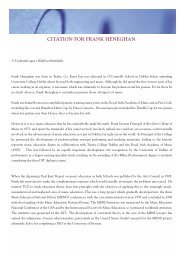TWICE THE SIZE - DIT Update - Dublin Institute of Technology
TWICE THE SIZE - DIT Update - Dublin Institute of Technology
TWICE THE SIZE - DIT Update - Dublin Institute of Technology
Create successful ePaper yourself
Turn your PDF publications into a flip-book with our unique Google optimized e-Paper software.
adopting processes or products that may have been developed by market leaders.<br />
Competitiveness in Ireland is now threatened by the double blows <strong>of</strong> rising costs and<br />
falling productivity.<br />
2. Critical to the Irish economy, therefore, is cost competitiveness, which has seriously<br />
declined over recent years partly due to domestic price inflation and exchange rate<br />
movements. Vital to restore Ireland’s cost competitiveness is a set <strong>of</strong> coordinated<br />
actions across a range <strong>of</strong> policy areas including fiscal policy, infrastructure and land<br />
use planning.<br />
3. The other crucial ingredient to competitiveness is productivity, which is not about<br />
working harder, but about working smarter. Government can influence a country’s<br />
productivity growth rates by ensuring its institutional structures and policy settings<br />
are supportive <strong>of</strong> investment, entrepreneurship, competition and innovation. It<br />
should also try to maintain a stable macroeconomic environment with well-managed<br />
public finances and price stability, as well as a regulatory environment that<br />
promotes competition on a flexible labour market which minimises red tape. At the<br />
level <strong>of</strong> the firm, productivity improvements centre on product innovation, use <strong>of</strong><br />
technology and management practices.<br />
4. The development <strong>of</strong> a knowledge intensive workforce is a key long-term source <strong>of</strong><br />
competitive advantage. A changing world, moreover, requires a flexible response to<br />
the development <strong>of</strong> human capital, and Ireland has benefited from the inward flow<br />
<strong>of</strong> skilled migrant labour. A number <strong>of</strong> actions, however, would contribute to the<br />
goal <strong>of</strong> nurturing and expanding the pool <strong>of</strong> knowledgeable human capital. These<br />
include: more investment in pre-school education; long-term investment in primary<br />
education; increasing the proportion <strong>of</strong> part-time students; strengthening career<br />
guidance in schools; promoting growth in the number <strong>of</strong> students studying science,<br />
mathematics and technology at second and third level; and devising a flexible suite<br />
<strong>of</strong> responses to encourage lifelong learning, training at work, adult literacy and<br />
practical options for adult leavers. Continued reforms and additional funds are also<br />
essential if Ireland’s higher education system is to rank among the best in the world<br />
in teaching, learning, research and development.<br />
5. With regard to fiscal policy and public finances Irelands’ low taxation strategy has<br />
been central to the economy’s performance over the past decade or so, but the<br />
corporate climate has recently become much more competitive. Public finances for<br />
the immediate future must adjust to more moderate growth in tax revenues, and<br />
Ireland’s taxation regime will have to wrestle with tax harmonisation proposals at<br />
EU level so as to remain competitive in the face <strong>of</strong> tax reform measures across a<br />
range <strong>of</strong> countries worldwide.<br />
6. Ireland’s declining competitiveness has meant that exporters have lost considerable<br />
market share over recent years. Restoring the traded sectors is paramount. For a<br />
small island economy, the ability to sell goods and services abroad remains crucial<br />
to future prosperity. There is a pressing need, therefore, to develop sales and<br />
marketing expertise in international markets.<br />
7. Lurking around all economies is the portent <strong>of</strong> inflation. All sectors across the Irish<br />
economy have a responsibility to constrain demands and restrain concessions so that<br />
77








